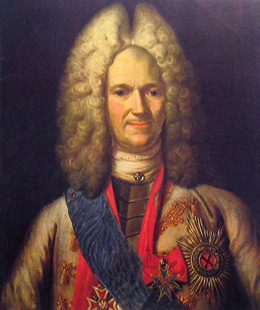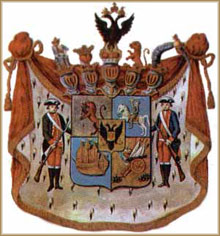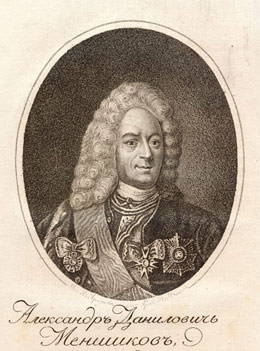|
 Aleksandr Danilovich Menshikov (1673-1729), Russian statesman and gifted military commander, whose
official titles included Generalissimo, Prince of the Holy Roman Empire and Duke of Izhora. He started out as a street vendor in Moscow at the
age of twenty. His handsome looks and smart sallies attracted the attention of Franz Lefort, Peter's most important favorite, who took him into
his service and finally transferred him to the tsar. At the death of Lefort in 1699, Menshikov succeeded him as Peter's key favorite and confidant.
During the tsar's first foreign tour, Menshikov worked at his side in the dockyards of Amsterdam where he acquired a thorough knowledge of
colloquial Dutch and German. He took an active part in the Azov campaigns (1695-96), and superseded Ogilvie as commander-in-chief during the
retreat from Charles XII in 1708. He subsequently participated in the battle of Holowczyn. In 1709 he prepared and completed a successful
operation against the Swedes near Oposhnya.
Aleksandr Danilovich Menshikov (1673-1729), Russian statesman and gifted military commander, whose
official titles included Generalissimo, Prince of the Holy Roman Empire and Duke of Izhora. He started out as a street vendor in Moscow at the
age of twenty. His handsome looks and smart sallies attracted the attention of Franz Lefort, Peter's most important favorite, who took him into
his service and finally transferred him to the tsar. At the death of Lefort in 1699, Menshikov succeeded him as Peter's key favorite and confidant.
During the tsar's first foreign tour, Menshikov worked at his side in the dockyards of Amsterdam where he acquired a thorough knowledge of
colloquial Dutch and German. He took an active part in the Azov campaigns (1695-96), and superseded Ogilvie as commander-in-chief during the
retreat from Charles XII in 1708. He subsequently participated in the battle of Holowczyn. In 1709 he prepared and completed a successful
operation against the Swedes near Oposhnya.
 He also played an important role in the Battle of Poltava where he commanded the vanguard of the
Russian army and then its left flank. He succeeded in capturing the Swedish general Shlippenbach before the main stage of the battle had even
started. He then proceeded to defeat Roos' detachment, thereby weakening the Swedish army to the point of making Russia’s victory inevitable.
After the battle Menshikov led the pursuit of the retreating Swedes and forced them to capitulate near Perevolochna on the Dnieper River.
For these successes he was promoted to the rank of field marshal. Following his service in the Courland, Holstein and Pomeranian campaigns from
1709 to 1714, he was appointed governor-general of Ingria. He was given almost unlimited powers, and was entrusted with a leading role in the
civil administration. Menshikov perfectly understood the principles on which Peter's reforms were based, and acted as the right hand of the tsar
in all his enormous undertakings. But his flagrant abuses of power and the damage and injury he caused brought him to the verge of ruin. Peter's
first furious reaction (March 1711) to Menshikov’s misconduct occurred when the tsar was informed about the looting that had occurred in Poland.
He also played an important role in the Battle of Poltava where he commanded the vanguard of the
Russian army and then its left flank. He succeeded in capturing the Swedish general Shlippenbach before the main stage of the battle had even
started. He then proceeded to defeat Roos' detachment, thereby weakening the Swedish army to the point of making Russia’s victory inevitable.
After the battle Menshikov led the pursuit of the retreating Swedes and forced them to capitulate near Perevolochna on the Dnieper River.
For these successes he was promoted to the rank of field marshal. Following his service in the Courland, Holstein and Pomeranian campaigns from
1709 to 1714, he was appointed governor-general of Ingria. He was given almost unlimited powers, and was entrusted with a leading role in the
civil administration. Menshikov perfectly understood the principles on which Peter's reforms were based, and acted as the right hand of the tsar
in all his enormous undertakings. But his flagrant abuses of power and the damage and injury he caused brought him to the verge of ruin. Peter's
first furious reaction (March 1711) to Menshikov’s misconduct occurred when the tsar was informed about the looting that had occurred in Poland.
 After the tsar returned to Russia in 1712, he discovered that Menshikov had tolerated wholesale corruption in his own governor-generalship.
Peter warned him "for the last time" to change his ways. However, after more cases of Menshikov’s fraud and misappropriation of money came to
light in the last year of Peter's reign, he was obliged to appeal for protection to the empress Catherine, the tsar’s wife. Catherine protected
Menshikov and he, with the assistance of his colleague Tolstoi, helped Catherine to secure the throne after the death of Peter in 1925. During
Catherine's short reign (February 1725 - May 1727), Menshikov had practically absolute power. He promoted himself to the unprecedented rank
of generalissimo, and was the only Russian to bear a ducal title. He contrived to hold on to his power after Catherine's death by means of a forged
will and a coup d'état. While his colleague Peter Tolstoi wanted to elevate Elizabeth Petrovna to the throne, Menshikov set up the young Peter II,
son of the tsarevich Alexei, with himself as dictator during the prince's minority. He also sought to reinforce his power position by marrying his
daughter Mary to Peter II. But the old nobility, represented by the Dolgorukovs and the Galitzines, united to overthrow him. On September 9,
1727, he was divested of all his titles and offices and expelled from the capital. Subsequently he was dispossessed of his enormous wealth, his land
holdings were taken from him, and he and his whole family were banished to Berezov in Siberia. He died in Siberia on November 12, 1729.
He left numerous descendants, many of them prominent members of the Russian nobility.
After the tsar returned to Russia in 1712, he discovered that Menshikov had tolerated wholesale corruption in his own governor-generalship.
Peter warned him "for the last time" to change his ways. However, after more cases of Menshikov’s fraud and misappropriation of money came to
light in the last year of Peter's reign, he was obliged to appeal for protection to the empress Catherine, the tsar’s wife. Catherine protected
Menshikov and he, with the assistance of his colleague Tolstoi, helped Catherine to secure the throne after the death of Peter in 1925. During
Catherine's short reign (February 1725 - May 1727), Menshikov had practically absolute power. He promoted himself to the unprecedented rank
of generalissimo, and was the only Russian to bear a ducal title. He contrived to hold on to his power after Catherine's death by means of a forged
will and a coup d'état. While his colleague Peter Tolstoi wanted to elevate Elizabeth Petrovna to the throne, Menshikov set up the young Peter II,
son of the tsarevich Alexei, with himself as dictator during the prince's minority. He also sought to reinforce his power position by marrying his
daughter Mary to Peter II. But the old nobility, represented by the Dolgorukovs and the Galitzines, united to overthrow him. On September 9,
1727, he was divested of all his titles and offices and expelled from the capital. Subsequently he was dispossessed of his enormous wealth, his land
holdings were taken from him, and he and his whole family were banished to Berezov in Siberia. He died in Siberia on November 12, 1729.
He left numerous descendants, many of them prominent members of the Russian nobility.
|
 History
History
 Dates and events
Dates and events
 Persons
Persons
 Poltava
Poltava
 Sights
Sights
 Photo gallery
Photo gallery
 Maps
Maps
 Virtual Museum
Virtual Museum
 Armament
Armament
 Uniforms
Uniforms
 Coins and medals
Coins and medals
 Flags
Flags
 Paintings
Paintings
 Poltava photographs
Poltava photographs
 News
News
 About us
About us
 Acknowledgments
Acknowledgments
 Main page
Main page
 top
top ...back
...back  History
History
 Dates and events
Dates and events
 Persons
Persons
 Poltava
Poltava
 Sights
Sights
 Photo gallery
Photo gallery
 Maps
Maps
 Virtual Museum
Virtual Museum
 Armament
Armament
 Uniforms
Uniforms
 Coins and medals
Coins and medals
 Flags
Flags
 Paintings
Paintings
 Poltava photographs
Poltava photographs
 News
News
 About us
About us
 Acknowledgments
Acknowledgments
 Main page
Main page